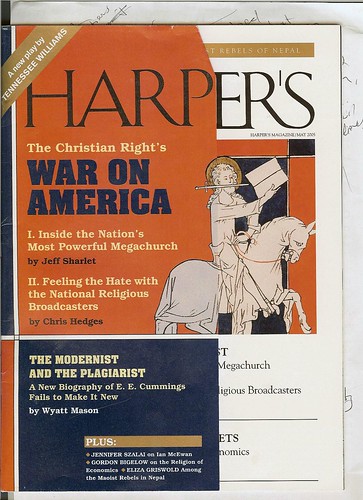War Correspondent writes about Christian war
Chris Hedges was a war correspondent for the New York Times for 11 years or so. Now he has written an article about "Feeling the Hate" at the Christian Broadcasters Association convention. It's part of a ultra-vitriolic issue that dehumanizes Christian conservatives so contemptuously that Stanley Kurtz wrote in National Review that the issue "could mark the beginning of a systematic campaign of hatred directed at traditional Christians."
But it's very interesting to learn about Hedges. There are two fascinating interviews with him here and here, in which he talks about his time covering wars. Hedges is extremely intelligent and articulate, and his comments are laden with good quotes.
This first quote is interesting because it informs us about how Hedges approaches his reporting on the Christian right:
I also grew up in a home with parents who were social activists, so my entire childhood was colored by the civil rights movement, the antiwar movement. When my father died in 1995, he was very involved in the gay rights movement. And I learned, because we lived in a small town in upstate New York, the cost of taking a moral stand -- that it was unpopular. I mean, Martin Luther King, in the early days of the civil rights movement, was one of the hated men in America. I felt the sting of what it meant to stand up for what you believe in or to support a cause that was just and, certainly at its inception, how difficult that was.
That developed, I think, a lot of anger in me -- anger at seeing my father, whom I admired, belittled by people in our town. I also read a lot as a teenager about the Holocaust and the Spanish Civil War, and I very much wanted that epic battle to define my own life. I used to regret as a teenager that I had not been of age in the thirties, that I couldn't go fight fascism like my hero George Orwell. By the time I was a divinity student, the military dictatorships in Latin America were carrying out horrendous crimes -- the "dirty war" in Argentina, Pinochet in Chile, the civil war in El Salvador. When I got to El Salvador, the death squads were killing 800 to 1,000 people a month, and I felt that, as a young man, this was as close as my generation was going to come to fighting fascism. And that is what propelled me toward war -- not because I was any kind of a gun nut, not because I came as a voyeur -- which some people do -- but out of a sense of justice, out of a sense of idealism.
But Hedges also has much to say about "the dark intoxication that war brings." He calls war "the most powerful narcotic invented by mankind." He also says, "Wars are always tragic, but probably inevitable."
I also understand what war can do, especially when you fall into the dark intoxication that war brings. That process of dehumanizing the other, that ecstatic euphoria in wartime, that use of patriotism as a form of self-glorification, that worshiping of the capacity to inflict violence -- especially in a society that possesses a military as advanced as ours -- all of those things I wanted to expose in the book, so that people would at least understand war for the poison that it is...
...War is like a poison. And just as a cancer patient must at times ingest a poison to fight off a disease, so there are times in a society when we must ingest the poison of war to survive. But what we must understand is that just as the disease can kill us, so can the poison. If we don't understand what war is, how it perverts us, how it corrupts us, how it dehumanizes us, how it ultimately invites us to our own self-annihilation, then we can become the victim of war itself.
Lastly, Hedges is profound about the power of love to triumph over evil.
Love is the only force that finally can counter the force of death -- the death instinct. When shells would come into Sarajevo and at the most horrific moment of death, when people were literally lying in pools of their own blood dying, family members, friends, brothers, sisters, spouses would claw through the crowds looking for their loved ones. Just as death seemed to radiate out from that point, at the same time love radiated out. You can't go through an experience like that and not understand the palpable power of love...
...To survive as a human being is possible only through love. And when Thanatos is ascendent, the instinct must be to reach out to those we love, to see in them all the divinity, pity and pathos of the human. And to recognize love in the lives of others -- even those with whom we are in conflict -- love that is like our own. It does not mean we will avoid war or death. It does not mean that we as distinct individuals will survive. But love, in its mystery, has its own power. It alone gives us meaning that endures. It alone allows us to embrace and cherish life. Love has the power both to resist in our nature what we know we must resist, and to affirm what we know we must affirm. And love, as the poets remind us, is eternal.



2 Comments:
that.. is profound..
apartment finder massachusetts providence
Post a Comment
<< Home